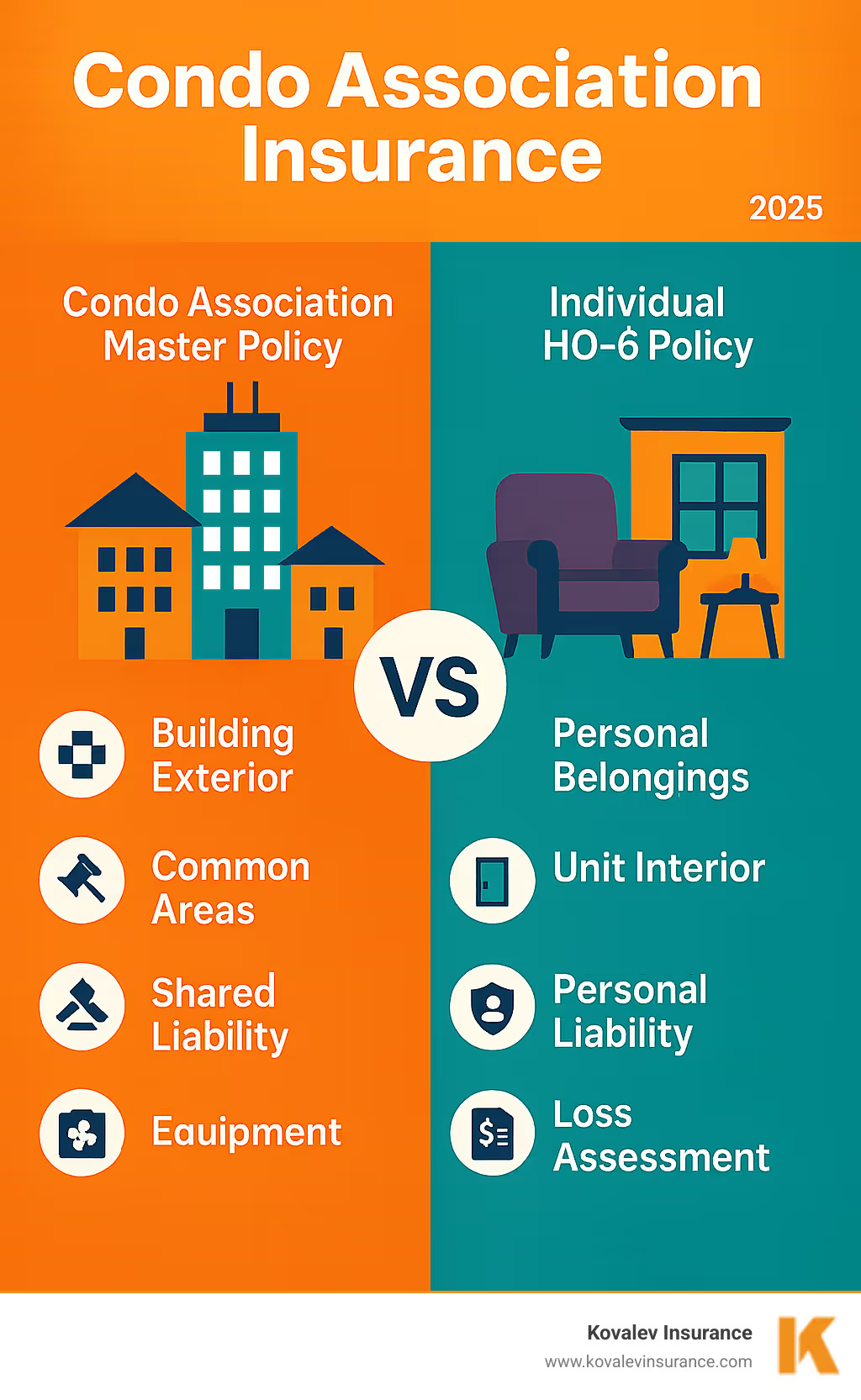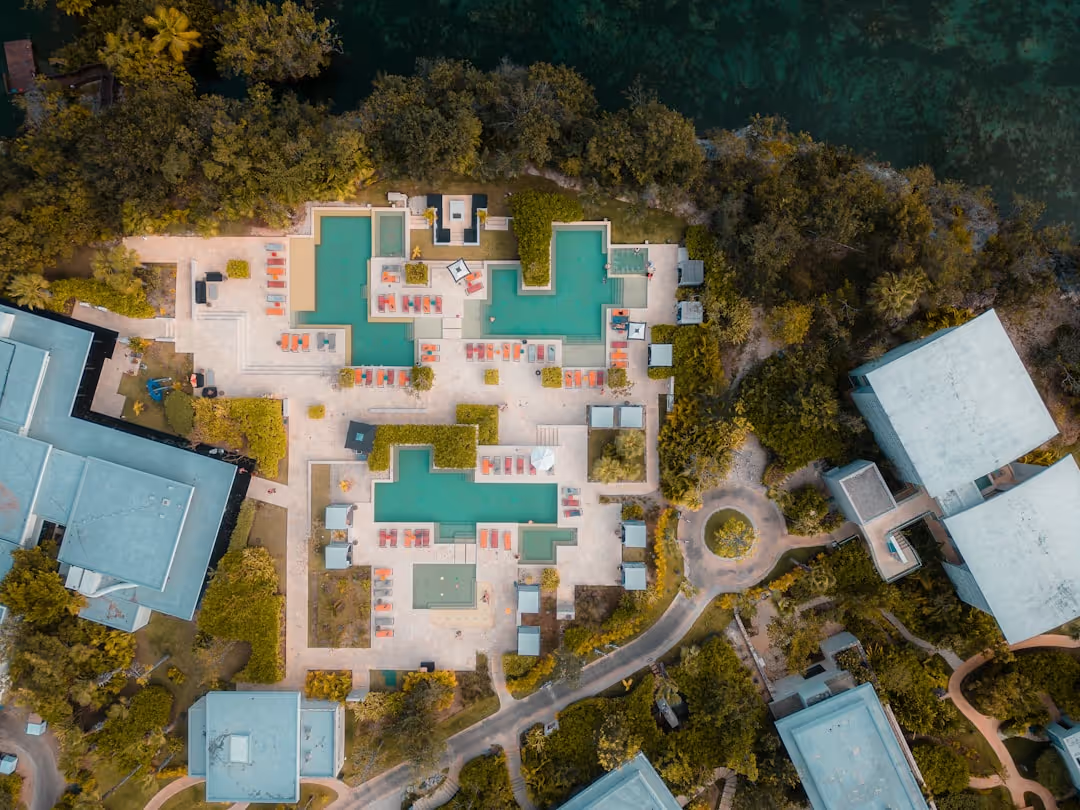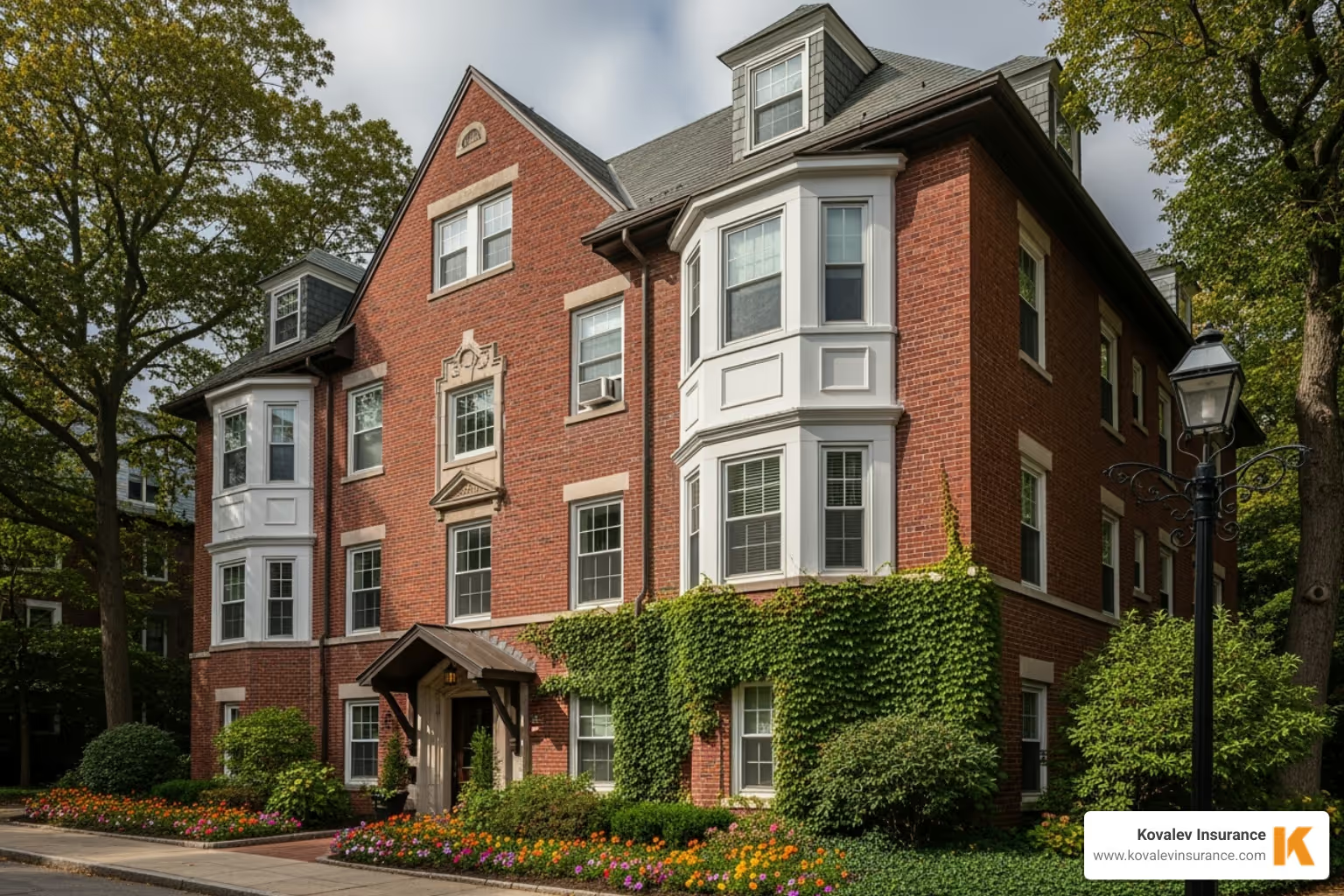Blog Content
6
Sep
2025

Condo association insurance is a master policy that protects the shared spaces and collective interests of a condominium community. It covers property that all unit owners share, such as building exteriors, lobbies, pools, and parking areas.
What Condo Association Insurance Covers:
If you live in a Massachusetts condo community in Newton, Wellesley, or Brookline, don't assume your individual HO-6 policy is enough. Your personal policy only covers what's inside your unit—your belongings, interior improvements, and personal liability. The master policy protects the shared investment that makes condo living possible.
The distinction is crucial: Without a proper master policy, a single lawsuit from a lobby accident could trigger special assessments costing each owner thousands. A fire damaging the building's exterior could leave residents to cover massive repair costs out of pocket.
Kovalev Insurance Agency has extensive experience with condo association insurance and has seen how the right coverage prevents financial disasters and keeps communities thriving.

Condo association insurance is the master policy that covers everything your individual HO-6 policy doesn't. While your personal policy protects your unit's interior, the master policy safeguards all shared spaces and structures.
This master policy isn't just about covering physical damage to common areas like lobbies, pools, and parking garages. It's your community's financial shield. When someone slips on ice in your Newton condo's courtyard, or when a storm damages the roof of your Wellesley building, condo association insurance handles costs that could otherwise devastate your community's budget.
In Massachusetts, this coverage is essential. Legal requirements under Massachusetts General Laws Chapter 183A mandate that condo associations maintain adequate insurance. Your bylaws and mortgage lender will also have specific requirements.
Without proper coverage, a single lawsuit or major repair could trigger special assessments costing each unit owner thousands. For example, some Brookline communities have faced $10,000 per-unit assessments due to inadequate liability coverage.

Serving on a condo association board involves a significant fiduciary duty to fellow residents, which extends beyond collecting fees and organizing meetings.
Key responsibilities include managing common elements like elevators and landscaping, enforcing bylaws, and, most critically, securing adequate insurance to protect everyone's investment.
In towns like Needham and Natick, proper insurance is crucial for protecting resident investments and maintaining property value. A well-insured building gives potential buyers confidence and provides peace of mind for current residents.
Every day, your condo community faces risks that could turn into expensive problems. Slip and fall accidents are a top risk, from wet lobby floors to icy walkways during Massachusetts winters.
Other major risks include property damage from fire or storms, vandalism to common areas, and lawsuits against the board, which makes Directors & Officers coverage essential.
Employee theft is another serious risk, especially for associations with large reserve funds. Fidelity coverage protects your community's financial assets from theft by employees or property managers.
If your association employs anyone - from part-time maintenance workers to full-time staff - you'll need workers' compensation coverage. Massachusetts law requires this protection, and our guide on MA Condo Workers Compensation explains exactly what your community needs to stay compliant and protected.
Your condo association insurance policy is a blend of different protections designed for specific community risks. Understanding its components and limits helps board members make informed decisions and shows residents how their fees protect them.

A well-designed condo association insurance policy covers the backbone of your community.
Building property coverage is the policy's foundation, protecting the physical structure (walls, roof, foundation), common areas (lobbies, hallways), and shared amenities like pools and fitness centers in communities from Newton to Brookline.
Commercial general liability covers legal costs and settlements if someone is injured in a shared space, like a slip on an icy walkway. It prevents a single accident from becoming a financial disaster for all unit owners.
Directors and Officers (D&O) liability protects board members from personal financial loss due to lawsuits arising from their decisions on budgets, maintenance, or rules.
Equipment breakdown coverage handles repair costs for essential systems like elevators or HVAC. This is crucial when a shared system fails in a Needham high-rise or during a Belmont winter.
Fidelity and crime insurance protects the community's financial assets from internal theft, such as embezzlement by a property manager or employee.
Many policies also include loss of income protection, which helps if a covered event reduces the association's ability to collect fees. For associations seeking even broader protection, additional insurance options for condo associations can provide improved coverage for specific risks.
Knowing your policy's exclusions helps you plan for additional coverage and avoid surprises.
Flood and earthquake damage require separate policies. Standard master policies do not cover these events, so associations in flood-prone areas of Massachusetts should secure separate flood insurance.
Normal wear and tear is not covered. Insurance is for sudden, unexpected events, not gradual deterioration like peeling paint or aging carpets. These are maintenance issues that should be covered by reserve funds.
Individual unit owner's personal property is a key exclusion. The master policy does not cover your furniture, electronics, or personal belongings. It also may not cover improvements you've made to your unit, like upgraded floors or cabinets.
Intentional damage and business activities within units are also excluded. The association's policy will not cover a lawsuit related to a business run from a unit in a Natick condo, for example.
The key to managing these exclusions is understanding them upfront. Associations can then make informed decisions about additional coverage, while unit owners can ensure their personal HO-6 policies fill the gaps that matter to them.
Understanding the difference between the association's master policy and your personal HO-6 policy is critical. Many condo owners mistakenly assume the master policy covers everything, a lesson often learned after a fire or water damage incident. The master policy protects the building's shared elements, while your HO-6 policy protects your personal space and belongings. Both are essential for your financial security. For a deeper look at why both policies are necessary, check out our guide on why residents need their own policy.
The master policy is the building's protective shell, covering the elements that make it a functional, shared living space. In your Newton or Wellesley condo, this includes:
Essentially, if you imagine turning the building upside down, anything that doesn't fall out and isn't inside an individual unit is likely covered. You can learn more about how these coverage costs compare in our article on Condo vs Homeowner Insurance Cost in Massachusetts.
Your HO-6 policy protects what's personal to you, stepping in where the master policy leaves off. Key coverages include:
Understanding how these policies work together is key to protecting your investment. For comprehensive information about individual condo insurance and how it protects Massachusetts residents, visit our detailed guide: More info about individual condo insurance.
No two Massachusetts condo communities are alike, and their insurance needs and costs reflect that. A Boston high-rise has different requirements than a brick complex in Newton. Understanding the types of condo association insurance and their pricing factors is key to making informed decisions. The type of master policy your association chooses fundamentally changes what's covered and what unit owners must insure separately.

Master policies determine how far coverage extends into individual units.
Bare walls coverage is the most basic option, covering only the building's structure: the shell, roof, foundation, and shared systems. It does not cover anything inside the individual units, such as drywall, flooring, cabinets, or fixtures. This responsibility falls to the unit owner's HO-6 policy. This approach keeps association premiums low but requires residents to have more comprehensive personal insurance.
Single entity coverage includes the building structure plus the original fixtures and finishes inside each unit as installed by the builder. This includes standard flooring, appliances, and countertops. A unit owner's HO-6 policy would then only need to cover personal belongings and any upgrades made beyond the original construction. This is a common middle-ground approach.
All-in coverage is the most comprehensive option, covering the building structure, original fixtures, and any improvements or upgrades made by unit owners. With this policy, a resident's HO-6 policy needs to cover only personal belongings, liability, and loss assessments. While association premiums are higher, it simplifies insurance for residents and is valuable in communities with frequent renovations.
Here's the critical part: you must check your association's governing documents to know which type of policy you have. This information should be clearly stated in your master deed or bylaws. Don't assume - verify.
Insurance companies assess many factors to determine your community's risk and premium.
Location: Proximity to fire services, local crime rates, and weather risks all affect premiums. A complex in Newton with good fire protection will have better rates than a remote one. Coastal properties in Massachusetts face higher storm-risk premiums.
Building age and construction: A modern concrete building is less risky than an older wood-frame one with outdated plumbing. Well-maintained older buildings with updated systems (like electrical or roofing) can secure lower premiums.
Safety systems: Modern fire sprinklers, monitored smoke detectors, and security cameras can lead to significant discounts by reducing the risk of major losses.
Claims history: A history of frequent claims will lead to higher premiums. Proactive maintenance and risk management can keep your record clean and costs down.
Deductible amount: A higher deductible lowers your annual premium but means the association pays more out-of-pocket per claim. The key is choosing a deductible your reserves can comfortably cover.
Replacement cost: Premiums are based on the cost to rebuild the entire complex today, not its market value. Regular appraisals are crucial to avoid being over- or under-insured, especially in high-value areas like Wellesley and Brookline. Proper valuation protects your community's investment.
The size and complexity of your community also matter. A 200-unit complex with extensive amenities naturally costs more to insure than a simple 20-unit building.
Understanding these factors helps your association make informed decisions about coverage and costs. For more detailed information about how these elements specifically impact Massachusetts condo insurance costs, you can explore our comprehensive guide on MA Condo Homeowners Insurance Cost.
As someone who's worked with countless condo associations across Massachusetts, I hear the same questions come up time and again. Whether I'm meeting with a board in Newton or helping unit owners in Belmont understand their coverage, these concerns are universal. Let me address the most common questions about condo association insurance.
Getting Directors & Officers (D&O) coverage right is critical to protect the personal assets of volunteer board members from lawsuits. A simple disagreement can lead to costly litigation. While a $1 million policy may seem sufficient, legal fees alone can exceed that. The right amount depends on your association's size, budget, and risk profile; larger associations with more amenities or substantial reserves need higher limits. The cost to increase coverage from $1 million to $3 million or more is often minimal. It's best to consult an experienced agent to determine the appropriate level of protection for your community.
This is a complex issue that depends on two factors: the source of the water and the type of master policy.
The key is to know what your master policy covers and ensure your HO-6 policy fills the gaps. Always review your association's bylaws and consult your insurance agent.
Yes. The Massachusetts Condominium Act legally requires associations to insure common areas and the building structure. Your association's bylaws and any lender agreements will likely impose even more specific requirements. However, meeting these minimums is just the starting point. Best practices involve securing additional coverages like Directors & Officers (D&O) liability, fidelity insurance, and equipment breakdown to fully protect the community from risks that could lead to special assessments. The law provides a floor, but a comprehensive policy provides true security for communities in Needham, Brookline, and across the state.
Think of condo association insurance as the invisible thread that weaves your community together. It's what allows you to walk through your lobby without worrying about slip-and-fall lawsuits, enjoy your pool without fretting over liability claims, and sleep soundly knowing that a major storm won't bankrupt your association through special assessments.
Throughout this guide, we've uncovered the essential truth: protecting your condo community requires both a comprehensive master policy and individual HO-6 coverage. It's a partnership between your association and each unit owner. The master policy shields your shared investment - those beautiful common areas, the building structure, and the amenities that make condo living special. Your personal HO-6 policy protects what matters most to you inside your unit.
The peace of mind this creates is invaluable. When both pieces work together, you're not just protecting property - you're preserving the sense of community that drew you to condo living in the first place.
As someone who has helped Massachusetts condo associations steer these waters for years, I've seen how proper insurance transforms communities. Boards can focus on enhancing resident life rather than scrambling to cover unexpected costs. Residents can invest in their units knowing their collective assets are secure.
Proactive management makes all the difference. The associations that thrive are those that view insurance not as a necessary evil, but as a foundation for their community's future. They work with experienced agents who understand the unique challenges facing condos in Newton, Wellesley, Brookline, and across our state.
At Kovalev Insurance a local Newton insurance agency near you, we've built our reputation on understanding these complexities. We know that every community is different - from the historic brick buildings in Newton to the modern complexes in Natick. That's why we take the time to understand your specific needs and craft coverage that fits like a glove.
Your community deserves expert guidance. Let us help you build that protective foundation, so you can focus on what really matters - enjoying your home and the community you've chosen to be part of.
Get a custom quote for your condo association insurance needs
X